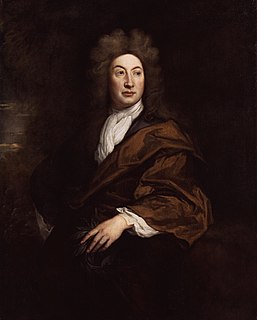The English Woman's Journal was a periodical dealing primarily with female employment and equality issues. It was established in 1858 by Barbara Bodichon, Matilda Mary Hays and Bessie Rayner Parkes. Published monthly between March 1858 and August 1864, it cost 1 shilling. After 1860 the Journal was published by Victoria Press in London, which was run by Emily Faithfull (1835–1895). She employed women workers, contrary to current practice in that period.

The British Critic: A New Review was a quarterly publication, established in 1793 as a conservative and high-church review journal riding the tide of British reaction against the French Revolution. The headquarters was in London. The journal ended publication in 1843.

The Poet Laureate of the United Kingdom is an honorary position appointed by the monarch of the United Kingdom, currently on the advice of the prime minister. The role does not entail any specific duties, but there is an expectation that the holder will write verse for significant national occasions. The origins of the laureateship date back to 1616 when a pension was provided to Ben Jonson, but the first official holder of the position was John Dryden, appointed in 1668 by Charles II. On the death of Alfred Lord Tennyson, who held the post between November 1850 and October 1892, there was a break of four years as a mark of respect; Tennyson's laureate poems "Ode on the Death of the Duke of Wellington" and "The Charge of the Light Brigade" were particularly cherished by the Victorian public. Four poets, Philip Larkin, Thomas Gray, Samuel Rogers and Walter Scott, turned down the laureateship. The holder of the position as at 2021 is Simon Armitage who succeeded Carol Ann Duffy in May 2019.

Edward William Cox known as Serjeant Cox (1809–1879) was an English lawyer and legal writer, who was also a successful publisher. He has been described as "the greatest entrepreneur of 'class' journalism".

The New Annual Register was an annual reference work, founded in 1780 by Andrew Kippis in London, England. It recorded and analysed the year's major events, developments and trends, throughout the world, as a rival to the Annual Register appearing from 1758, under the editorship of Edmund Burke. After Kippis died in 1795 it was taken on by Thomas Morgan (1752–1821). George Gregory edited it, and changed its Whig politics to Tory at the time of the Addington ministry. It was published until 1825.
Borderland was a magazine founded and edited by William Thomas Stead from 1893 to 1897. The focus of the publication was on spiritualism and psychical research, mainly from a supportive point of view.

The National Association for the Promotion of Social Science (NAPSS), often known as the Social Science Association, was a British reformist group founded in 1857 by Lord Brougham. It pursued issues in public health, industrial relations, penal reform, and female education. It was dissolved in 1886.
Agnes C. Hall (1777–1846) was a Scottish writer of novels and non-fiction articles, and also a translator. She used the pseudonym Rosalia St Clair.
James Shergold Boone (1799–1859) was an English cleric and writer.
Robert Hogarth Patterson (1821–1886) was a Scottish journalist and author.

The General View series of county surveys was an initiative of the Board of Agriculture of Great Britain, of the early 1790s. Many of these works had second editions, in the 1810s.
William Hawes (1805–1885) was an English businessman, banker and reformer, noted for efforts to improve the workings of the Poor Laws, bankruptcy law and excise.
William Shaw (1749–1831) was a Scottish Gaelic scholar, writer, minister and Church of England cleric. He is known also as friend and biographer of Samuel Johnson. His 1781 paper on the Ossian controversy is still considered a good survey of critical points.
The Phytologist was a British botanical journal, appearing first as Phytologist: a popular botanical miscellany. It was founded in 1841 as a monthly, edited by George Luxford. Luxford died in 1854, and the title was taken over by Alexander Irvine and William Pamplin, who ran it to 1863 with subtitle "a botanical journal".
Frederick Mullett Evans (1803–1870) was an English printer and publisher. He is known for his work as a partner from 1830 in Bradbury & Evans, who printed the works of a number of major novelists, as well as leading periodicals.
Sir Robert Coke of Caludon Castle, Coventry, Huntingfield, Suffolk and Epsom, Surrey was an English politician.
Helen Christian Sutherland, married name Helen Denman, was an English art patron and collector.
The Reader was a British weekly published from 1863 to 1867. Intended as a review journal, for both science and literature, it has been called "probably the last attempt, in Victorian England, to keep together liberal scientists, theologians, and men of letters."
Mary Margaret Busk born Mary Margaret Blair was an English writer and translator.





